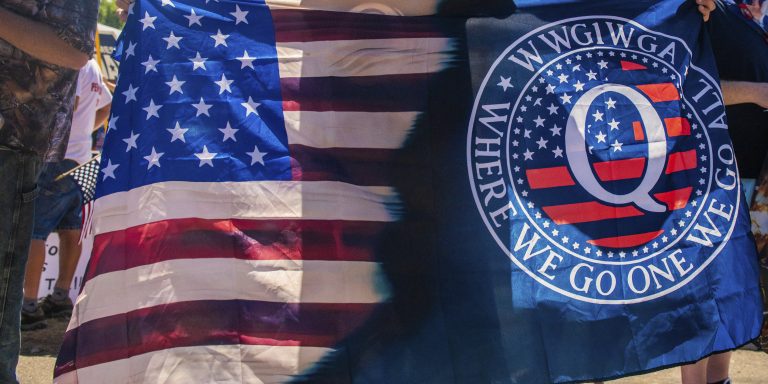
FBI Director Wray remains concerned about the national security threat posed by QAnon conspiracy theories and adherents of this movement.
Key tenets of the QAnon conspiracy theory appeal to a significant number of Americans, according to a new Soufan Center report.
Russia-driven amplification of QAnon-related narratives was predominant in 2020, but began to wane beginning in 2021.
China-related perpetuation of QAnon conspiracies proliferated toward the end of 2020 and now outpaces Russia-related amplification.
In testimony last week to the United States Senate Intelligence Committee, FBI Director Christopher Wray highlighted the continuing national security threat posed by adherents of the QAnon conspiracy theory. Wray’s comments echo longstanding concerns within the Bureau, dating back to 2019, regarding the ability of online conspiracy theories to inspire real-world harm by individuals and small groups. QAnon believers committed various acts of murder, plotted political violence, and kidnapped children; in 2021, more than three dozen QAnon members were arrested (one was killed) for storming the U.S. Capitol building during the January 6 insurrection. In the aftermath, the main protagonist of the QAnon narrative, President Donald J. Trump, failed to be reinstated, as prophesized, and the shadowy individuals behind QAnon’s online postings have failed to deliver new content for months. This begs the question, why is the FBI still concerned about QAnon? The Soufan Center’s latest special report, “Quantifying the Q Conspiracy: A Data-Driven Approach to Understanding the Threat Posed by QAnon,” clarifies that the QAnon threat persists because its core message continues to resonate with large numbers of the American public. Moreover, the report lays out evidence that foreign-based actors, located in China and Russia, among other states, are amplifying QAnon-related content.
Based upon multiple surveys conducted between December-February, the new Soufan Center report highlights that, among those surveyed, 20.5% to 22.6% characterized themselves as either a QAnon member, believer, or supporter. The survey data also demonstrated that more than 40% of those surveyed believed that there was significant voter fraud that swung the election. Additionally, survey responses discovered that more than 25% polled believe that political elites were engaged in a global pedophile ring. Additionally, among those polled, more than 30% on average believed COVID-19 related conspiracy theories. In a separate 2020 survey conducted by NPR/Ipsos, 17% of those polled believed the central tenet of the QAnon conspiracy—that there is a global Satan worshipping pedophile ring trafficking children, and narratives emerging from these themes, including anti-vaccine concerns. Given its reach and prior links to incidents of violence, it is highly probable that QAnon conspiracy theories will inspire individuals to conduct future acts of political violence.
The scope of the QAnon threat, as revealed by TSC’s special report, is compounded by the amplification of QAnon conspiracy theories by foreign-based actors. Throughout much of 2020, Russian amplification of QAnon narratives dominated the foreign influence landscape, especially over Facebook but not limited to it. Yet, it bears noting that Russian disinformation campaigns targeting the United States are not new. In the 1980s, the Soviet Union’s KGB ran “Operation Infektion” in an effort to tarnish the reputation of the CIA by claiming the agency created HIV/AIDS in a laboratory. Indeed, the disinformation campaign had resonance, with one study by Oregon State University noting that 15% of Black Americans believed that the U.S. Government was intentionally targeting them with HIV/AIDS. Russian amplification, simply put, is part of a long-standing Russian effort to undercut the global influence of the United States. In sowing the seeds of discord within the United States, the objective in the short run is to curtail U.S. adventurism in Eastern Europe. Furthermore, given the recent Russian build-up of military forces in Ukraine, the U.S. should anticipate an increase in Russian amplification of QAnon narratives over social media. In the long-run, Russia’s amplification of QAnon conspiracy theories is in keeping with its longtime challenge to the United States’ brand of democracy. However, as the report notes, current dynamics driven by the crisis brought on by the pandemic and political polarization in the U.S. also create the necessary enabling environment for such beliefs to take root.
Yet, QAnon conspiracy theories are not just being wielded by the Russian Federation. The Soufan Center (TSC) report’s most notable finding is that China-based influence operations are now most frequently amplifying QAnon-related falsehoods. According to TSC data, China closed the gap on Russia by becoming more active in spreading QAnon-related content and, in 2021, surpassed the Russian Federation. This finding is particularly interesting given that throughout much of 2020, President Trump and QAnon followers derided China, often using incendiary rhetoric related to the COVID-19 outbreak. Chinese amplification of QAnon messaging in the United States is especially ironic given the Chinese Communist Party’s rhetoric that chastises countries for meddling in “internal” Chinese matters, such as the government’s persecution of Uighurs in Xinjiang. Yet, Chinese disinformation efforts grew throughout 2020; the use of QAnon as a mechanism to create discord in the United States is unsurprising, especially given the dismal state of China-U.S. bilateral relations. At the same time, it fits the long-term strategy of illuminating tensions and inequalities that persist in American society. Thus, China, like the Russian Federation, is likely to continue to augment disinformation operations against the United States by amplifying conspiracy theories.
No comments:
Post a Comment